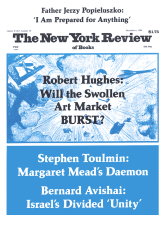To the Editors:
Recently there has been a series of drastic and little publicized repressive measures taken against independent intellectuals in Yugoslavia. On April 28 persons who were attending a meeting in a private apartment were arrested, some of them were beaten. Although most of them were soon released from prison, others were rearrested. One working class member of the group was later found dead under suspicious circumstances. One assistant professor from Sarajevo, Dr. Vojislav Seselj, was rearrested in May and tried in July on charges of “acting with the intention of over-throwing the existing social order.” The primary evidence used in this scandalous trial was an unpublished manuscript which the police took from his apartment. On July 9, Dr. Seselj was sentenced to the unusually harsh penalty of eight years in prison.
On August 6, six young intellectuals (Milan Nikolić, Pavlusko Imsirović, Vladimir Mijanović, Gordan Jovanović, Dragomir Olujić, and Miodrag Milić) were indicted in Belgrade on similar charges. Some of them had been leaders of the 1968 student protests and were outspoken in defending the academic rights of the Praxis group. The trial was announced for late September or early October. It has been postponed, in part as a result of protests from abroad, but has been scheduled to begin on November 5. The case against these six is particularly alarming, because it is based upon their participation in the Free University—open theoretical discussions—organized by the Praxis professors. There are hundreds of other young intellectuals who are threatened by this action, and who might also be sent to prison on similar charges.
Yugoslavia has pursued an independent policy under Tito and has been far more tolerant to the expression of free opinion than other communist countries. But the severity of the economic crisis it is now experiencing and the growing power of “hardliners” has resulted in a harsh crackdown. International public opinion can play a decisive role by expressing protest against these recent acts of repression and intimidation, and making clear to the government how much the international reputation of Yugoslavia stands to suffer. We urge the appropriate authorities in Yugoslavia to drop all charges against the six who are now indicted and to release immediately Dr. Vojislav Seselj from prison. We also urge all those who share our concern to communicate their views to the appropriate Yugoslav authorities. Letters and cables should be sent to Veselin Djuranović, President of the Socialist Federal Republic of Yugoslavia, Bulevar Lenjina 2, 11070 Belgrade, Yugoslavia; Ambassador Mika Rakić, Embassy of the Socialist Republic of Yugoslavia, 2410 California Street NW, Washington, DC 20008. Copies of correspondence should be sent to the defendants’ lawyer, Srdja Popović, Attorney at Law, Takouska 19, Belgrade, Yugoslavia.
For the Committee Against Intellectual Repression in Yugoslavia:
Richard J. Bernstein, Norman Birnbaum, Robert S. Cohen, Noam Chomsky, Drucilla Cornell, Fred Dallmayr, Donald Davidson, Robert Davies, Helen Davis, Abraham Edel, William Evan, Elizabeth Flower, Mark Gould, Adolf Grünbaum, Henry Hiz, Charles Kahn, William McBride, Lucius Outlaw, Helen Parsons, Richard Rorty, Amos Vogel
This Issue
December 6, 1984



